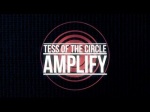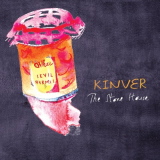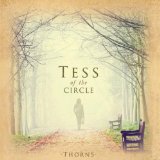 It’s just under three years since the gentle, acoustic Tess of the Circle debut, “Thorns”, was released and reviewed here in 2013. You would expect the band to move on in that time, but this is a radical departure, a bit like Dylan going electric, but no-one here at Riot Towers is crying ‘Judas’. The clue’s in the title; “Amplify” is the sound of Tess Jones and Lee Clifton picking up electric guitars, turning up the volume and exploring the more rambunctious side of their music. Powered by the creative rhythm section of Ben Drummond (bass) and Paul Stone (drums), the band has produced an eclectic, riff-driven, powerhouse of an album.
It’s just under three years since the gentle, acoustic Tess of the Circle debut, “Thorns”, was released and reviewed here in 2013. You would expect the band to move on in that time, but this is a radical departure, a bit like Dylan going electric, but no-one here at Riot Towers is crying ‘Judas’. The clue’s in the title; “Amplify” is the sound of Tess Jones and Lee Clifton picking up electric guitars, turning up the volume and exploring the more rambunctious side of their music. Powered by the creative rhythm section of Ben Drummond (bass) and Paul Stone (drums), the band has produced an eclectic, riff-driven, powerhouse of an album.
The seventies influences are impossible to ignore, with elements of rock, prog and even a bit of folk in there as well, but Tess and Lee’s playing combined with Tess’s raw and slightly vulnerable vocal put their original stamp on the album as it moves through rhythmic changes and interesting chord patterns. If you’re looking for some common ground between this and “Thorns”, you’ll find it in the lyrics, taking an introspective look at relationships; some are working, some aren’t and some are over.
The album opens with “Love is the Drug that You Crave”, a monster guitar riff underpinned by a melodic bassline, organ and massed harmonies in the chorus. There’s just a hint of Atomic Rooster in there, if anyone remembers them. As the album unfolds, there are psychedelic references in “I’m Not Ashamed”, folk/rock vocal intonations and call and response on “Face the Changes” (maybe a hint of Roger Chapman without the vibrato) and a drift from unison guitar riffs on “Drowning Without You” to solo with a heavy Indian influence; on a raga tip, you might say.
The final three songs move back towards the stylings of “Thorns” with the gentle lead vocals and some lovely backing vocals of “Summer Rain”, the string section on “The Waves Break us Down” and the mandolin-led arrangement of the closer, “This Higher Ground”, creating a feel of the song cycle spread over the two Tess of the Circle albums.
Tess Jones has taken the impassioned songs of his first, mainly acoustic album, dialled up the power, and created an album that stays true to his singer/songwriter roots while introducing twin lead guitars, Ginger Baker/Keith Moon drums and various rock and folk stylings to spice up the mix. It can stand alone as a rock album or be seen as an electric companion piece to “Thorns”. Either way, it’s a fine piece of work.
“Amplify” is released on 22nd April on Cadiz Music (VINVOC016).
 Well, this is certainly very different from most of the albums I’ve reviewed recently, apart from the Tess of the Circle album, “Thorns”. Kinver are Ian Parker (guitars and vocals), Beth Porter (cello and backing vocals), Alex Thomas (drums and percussion), Steve Amadeo (bass) and Morg Morgan (piano and Hammond) and they play the gentle, melodic and sometimes haunting songs of Ian Parker. If you’re after banging rhythms and loads of digital effects, then you’re in the wrong place; the arrangements of the songs on their debut, “The Stone House” are tasteful and subtle, demonstrating great technique without any hint of overplaying.
Well, this is certainly very different from most of the albums I’ve reviewed recently, apart from the Tess of the Circle album, “Thorns”. Kinver are Ian Parker (guitars and vocals), Beth Porter (cello and backing vocals), Alex Thomas (drums and percussion), Steve Amadeo (bass) and Morg Morgan (piano and Hammond) and they play the gentle, melodic and sometimes haunting songs of Ian Parker. If you’re after banging rhythms and loads of digital effects, then you’re in the wrong place; the arrangements of the songs on their debut, “The Stone House” are tasteful and subtle, demonstrating great technique without any hint of overplaying.
The songs are introspective, confessional folk/rock of the type that was incredibly popular in the early 70s. The opening track,” The Lights” sets the tone for the album with a cello riff (there’s a phrase I never thought I’d use) played over some clipped guitar chords as an intro before the song unfolds into a story of loss and redemption, common themes throughout the album. The gentle “The Will to Dance” leads into what is musically the bounciest track on the album, the almost-jaunty “From the Start”. “Ten Thousand” is a twenty-first century protest song wrapped up in a very gentle, laid-back style while “Silent Void” has a folky start and is probably the most confessional song on the album, but more about that later. “Turning to Light” starts with a military drum pattern, but soon drops into the familiar low-tempo band groove while “Waste in Chains” features a nice finger-picked guitar accompanied by cello, before dropping into a country-feel middle section, then back to guitar and cello. The gloomy “Lonelier Souls” acts as a contrast with the uptempo and lyrically upbeat “Basket” and with “Halfway Home”, the album closes as it opened with guitar, cello and viola.
Musically the album is pretty easy on the ear; the performances are very good throughout and the band move through a variety of styles with ease and Ian Parker has a very good voice, reminiscent at times of another West Midlander, Stephen Duffy. Lyrically, it isn’t such an easy listen. Ian Parker, as a lyricist, pulls out some interesting metaphors including this in “From the Start”: ‘It occurred to me you see that I’d never really be quite round enough for many of life’s holes’, but it’s the content overall that I’m less sure about.
I’m quite partial to a bit of melancholy, even misery, in my music but on “The Stone House” it’s almost inescapable. There’s an air of fragility which runs through each track on the album, in the music as well as the lyrics and a sense of alienation in the lyric above, but also in several references to misfits and addiction. The songs could have been sequenced to create a narrative of redemption (or the opposite) but we’re left guessing how the story actually ends. It’s difficult to tell if a song is confessional and based on biographical events, or a complete work of fiction but if “The Stone House” is based on reality, then I really hope that making the album has helped Ian Parker through a difficult time. If it’s a creation and not a confession, then it’s a very convincing portrait of a desperately difficult existence.
CD release Monday October 21
 Well, this is certainly a welcome change of pace to fit in with the British summer arriving at last. Tess of the Circle is a collective of musicians built around the (confusingly, male) singer/songwriter Tess Jones and, in terms of songs and arrangements, harks back to the classic era of British folk/rock in the seventies. The songs on “Thorns” are very much in the introspective lyrical mould which first became popular at that time with the success of Carole King and James Taylor and the arrangements vary from solo acoustic fingerpicking and vocal to full group arrangement with drums, bass, keyboards and strings.
Well, this is certainly a welcome change of pace to fit in with the British summer arriving at last. Tess of the Circle is a collective of musicians built around the (confusingly, male) singer/songwriter Tess Jones and, in terms of songs and arrangements, harks back to the classic era of British folk/rock in the seventies. The songs on “Thorns” are very much in the introspective lyrical mould which first became popular at that time with the success of Carole King and James Taylor and the arrangements vary from solo acoustic fingerpicking and vocal to full group arrangement with drums, bass, keyboards and strings.
“Thorns” is the second album from Tess, following the solo “Magpie” in 2010 and the band assembled for the project all have solid experience of working with well-known performers apart for the guitarist Lee Clifton, who auditioned by dubbing his own guitar parts on to the band’s demos. While working on an indie label budget, he’s managed to attract some major label players to the project with the strength of his songs and this quality shows in musical settings where the players rely on skill and technique rather than volume and effects to fill out the arrangements.
The album opens with the current single “Better Days” which, after a low-key intro, is driven along by a rhythm pattern from the two strummed acoustics and slightly discordant strings enforcing the lyrical theme of escape and growth. “Vagabonds and Rogues” is a mid-tempo, mainly acoustic piece leading in to the opening electric riff of “Cracks and Burns”, which demonstrates a slightly different, harder-edged approach to the songs made possible by using the full band. “Eyes of a Clown” is another introspective acoustic piece, this time filled out by a haunting string arrangement. “History” is much more uptempo with an intro which vaguely recalls the Divine Comedy’s “National Express”. I’m guessing that the position of “Lifesong” at the centre of the album is quite deliberate; all of the songs are very good, but this stands out from the very first hearing. The Latin rhythm patterns of the acoustic guitar intro are emphasised by the piano part and it feels like this is the song where everyone gave it their best shot. Tess’s voice is powerful throughout, but is really exceptional here and Lee Clifton’s guitar work generally, but particularly the two solos, is stunning.
“Say What You Want (Run)” takes the foot of the pedal a little before “No Place Like Home” where Tess Jones vocal sounds incredibly like Greg Lake (yep, the ELP Greg Lake), featuring yet another lovely guitar solo. The title track is a gentle, mainly acoustic piece, about a relationship which isn’t quite working, building up to a full band section and an acoustic coda. The poignant “Mixed Emotions”, with its lilting strings is the penultimate song before the closer, “”Girl in the Window” goes back to Tess’s performing and writing roots with finger-picked acoustic backing and ethereal backing vocals bringing the album to a wistful close.
You can certainly hear the influences on this album; it has a very seventies feel with references to gentle troubadours of that era but there’s also a move towards the raunchier folk feel of Jethro Tull, for example. There are eleven well-crafted songs here which are delivered by incredibly good musicians playing subtle and intricate arrangements. If you appreciate those qualities, and I certainly do, then you should be listening to “Thorns”.
Out on July 17th on Vintage Voice Records Ltd. (VINVOC005).


